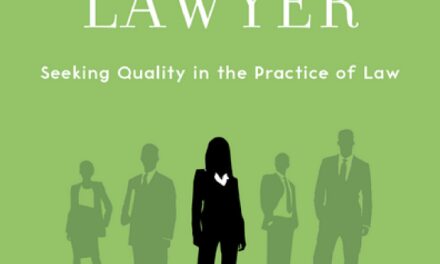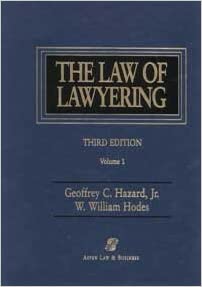Deliberation,
Practical Wisdom, and Idealism:
Complex Brilliance and Profundity of
LOST LAWYER, Second Essay
Anthony T. Kronman, a law professor, a Dean of the Yale Law School, and
institution where he has spent most of his adult life, and a philosopher. In the book THE LOST LAWYER he is formulating
ideals of the legal profession which he claims dominated the image of
excellence in American for about 150 years, maybe starting around the time of
the Revolution, or so. Public mindedness is a central feature of that ideal is
important, and for this reason he names the image of the ideal “the
lawyer-statesman.”
mindfulness of the ideal. I was interested in how Kronman’s main principles apply to the private practice of
law. To some extent, he had a subordinate interest in the same thing. In summary his lawyer-statesman image and implications the ideals involves a dedication to
the use of practice wisdom as a foundation for lawyering; the idea was, in part, that practical wisdom depends heavily on certain emotions, particularly sympathy; that truly excellent lawyer’s have talent for deliberation as well as advocacy; that the excellent practice of law requires that cases be thought of on a case-by-case basis and no fundamentally on the basis or iron-clad, universalistic rules, and that all of
these run so so deep that they counts as traits of character and so important that then should be treated as virtues.
BACKGROUND
Interestingly, these ideas stretch back to Greek
philosophers, in particular Aristotle, but with Plato in the background. Kronman studied these topics as he took his
Ph.D. in philosophy at, where else, Yale.
Much else in the book is philosophical, in particular his discussion of
the various jurisprudential theories of the Twentieth Century, including legal
realism, formalism, economic restructuralizations built into the nature and
content of the law, legal evolution, legal reasoning, and so forth. (In
addition, he realizes what many do not and that is that jurisprudence is really
philosophy of law by another name and that the philosophy of law is a province
within the empire of philosophy.
his current shallow critics. They are wrong about almost everything. A great
many lawyers agree that we should not view ourselves as “mere” technicians executing our client’s predetermined plans
(even though we owe our clients a duty of loyalty and zealous representation),
nor are our normative roles in the attorney-client relationship simply helping
the client structure the means for his achieving his ends. Many of us believe
in helping, and actually try to help, clients consider their ends. Kronman
nails this idea perfectly; his critics seem to miss it and miss justifying this
complex conception of lawyering, and its public, social, and moral dimensions.
ideas philosophical ideas that have a important impact on how insightful lawyers conceive of as being lawyers.
One of them is idea of regret, an idea that that critics discussed. I in Part I do not discuss this matter, and it may be very important to some of us.
The second idea is the idea of finding meaning in life. This idea does not so much involve how to practice of law, as it does the impact the practice may have on souls practicing lawyers and how one conceives the nature of being a law-professional will pollster or undercut the idea that the nature of the legal profession can provide practicing lawyers a route to finding life’s meaning for them.
My remarks—and that’s all they are—are a tentative, speculative, and only possible criticism.
Regret
help understand at least one feature of personal life. The one he emphasized is regret. This is a special problem for many lawyers, if for
no other reason than many of us regret having become lawyers at all. But there are lots of other reasons too:
- “Why even did become being a divorce lawyer?”
- “Litigation turns out not to be my thing. . . .Well, maybe environmental law would have been OK.”
- “Corporate law is so, so boring.”
- “I’m so sick of the client’s bitching about fees. I wish I’d never gotten into this. What I would given for a regular salary.”
- “I’m so sick of insurance companies never paying anything even close to on time.”
The main
idea of Kronman here is if one feels regret—certainly, one might say—in any significant
decision, one is left with the situation of failing to be a friend to one’s self. This idea, or image, comes from
Aristotle, and he was certainly right about it.
At the same time, Kronman may be pointing out that practical wisdom and
deliberation may be helpful in avoiding dreadful decisions that get regretted
later and that they may be helpful and eliminating regret if and when it comes.
wisdom, according to Kronman, is a matter of character—permanent character. If so, I guess, it should be present in the young
“versions” of whoever has it as an adult. But surely that is when some of the
most regrettable decisions get made. At
least many boys (and girls, I guess) are not capable of using practical wisdom
at a young age. How can teenagers be expected to exercise practical wisdom in picking life goals, professions, callings, and so forth. It is fantasy to suppose that they can do this; it is dreaming to suppose that people are born with wisdom.
events in one’s life are not exactly making a decision but the failure to do
so. (“I’ve become a lawyer. This was a bad idea. I need to bail out. I wonder where to go and what to do. I don’t
know. Nothing looks really attractive. I guess I won’t leave.”) One may not
even realize the source of whatever one’s consciousness is telling one. (“I’m depressed. I’ve been so for a while
now. I wonder what’s causing it.)
restricted to the legal professional. The lives of lawyers—a group which may
have as much or more regret distributed around the profession as any other—is a
good place to focus. Then again, it would be nice to have data as to whether lawyers have more regrets than other job categories–even other professions.
Other folks from different vocational categories have not said much to me about their vocational regrets. Then again, maybe I the wrong sort of person to whom to mention this sort of thing.





Recent Comments